Increasing Security Features: Lowering Theft Risk

Understanding Car Theft Risk and Insurance Premiums
Okay, let's talk about something nobody wants to think about: car theft. But hey, facing the facts can actually *save* you money. Insurance companies aren't just pulling numbers out of thin air; they're assessing risk. The higher the risk of your car being stolen, the higher your premium. So, anything you can do to *lower* that risk makes you look good in their eyes.
Think about it. If you live in an area with a high rate of car theft, or if you drive a car that's a popular target for thieves (looking at you, Honda Civics!), your insurance company is going to charge you more. It's just business. That's why upping your car's security is a smart move, both for protecting your ride and your wallet.
The Power of Visible Security Features: Deterring Thieves
Sometimes, the best defense is a good offense... or, in this case, a good *deterrent*. Visible security features are like saying, "Hey, thief, this car isn't worth the hassle." They make your car a less attractive target compared to the one parked next to it that has nothing. Let's break down some good options:
Steering Wheel Locks: A Classic Car Theft Deterrent
Yeah, they might look a little old-school, but steering wheel locks are still surprisingly effective. They're a visual deterrent that says, "This car is going to be a pain to steal." Plus, they're relatively inexpensive. Think of it as a cheap insurance policy... on top of your *actual* insurance policy!
Product Recommendation: The Club CL303 Steering Wheel Lock. It's a popular choice, known for its durability and ease of use. You can usually find it for around $30-$50.
Car Alarms: Loud Noises Scare Thieves Away
A good car alarm is like a screaming banshee when someone tries to mess with your car. The loud noise and flashing lights are often enough to scare off potential thieves. Modern car alarms can even send alerts to your phone if something's happening.
Product Recommendation: Viper 5706V Responder LC3. This alarm system offers two-way communication, meaning you'll get alerts on your remote or smartphone if your alarm is triggered. Expect to pay around $200-$400, including professional installation.
Window Etching: Making Your Car Less Attractive to Chop Shops
This one's a little less obvious, but it's a smart move. Window etching involves engraving your car's Vehicle Identification Number (VIN) onto the windows. This makes it much harder for thieves to sell your car or its parts, because the VIN is tied to *your* car. Chop shops don't want the hassle.
You can often get window etching done at your local DMV or through your car insurance company. Sometimes it's even offered as a free service! Definitely worth looking into.
Advanced Security Systems: GPS Tracking and Immobilization
If you're serious about protecting your car (and potentially getting a bigger discount on your insurance), you might want to consider a more advanced security system. These systems often include GPS tracking, remote immobilization, and other high-tech features.
GPS Tracking Systems: Locating Your Car After Theft
GPS tracking systems allow you to track your car's location in real-time. If your car is stolen, you can use the GPS data to help the police recover it. Some systems even offer geofencing, which alerts you if your car moves outside of a designated area.
Product Recommendation: LoJack. LoJack is a well-known GPS tracking system that's been around for years. It's a bit more expensive than some other options, but it's known for its reliability and effectiveness. Expect to pay around $700-$1000, including installation.
Immobilization Systems: Preventing Thieves From Starting Your Car
Immobilization systems prevent thieves from starting your car. These systems typically require a key fob or a code to start the engine. If the correct authorization isn't provided, the car simply won't start. This is a great way to prevent your car from being driven away.
Product Recommendation: Ravelco Anti-Theft Device. This system is a bit different – it's a hidden plug that interrupts the electrical system, making it virtually impossible to start the car without the special plug. It's a more permanent solution and can be very effective. Prices vary depending on the installer, but expect to pay several hundred dollars.
Comparing Security Features: Finding the Right Fit for Your Needs and Budget
So, which security features are right for you? It really depends on your individual needs and budget. Here's a quick comparison:
| Feature | Pros | Cons | Price Range |
|---|---|---|---|
| Steering Wheel Lock | Inexpensive, visible deterrent | Can be bypassed by determined thieves | $30-$50 |
| Car Alarm | Loud, can scare off thieves, some offer remote alerts | Can be triggered by accident, may annoy neighbors | $100-$400 (installed) |
| Window Etching | Inexpensive (sometimes free), makes car less attractive to chop shops | Doesn't prevent theft, just makes it harder to sell | Free - $50 |
| GPS Tracking System | Allows you to track your car if it's stolen, can help police recover it | More expensive, requires subscription | $200-$1000 (plus subscription) |
| Immobilization System | Prevents thieves from starting your car | Can be more complex to install, may require professional installation | $300 - $800+ (installed) |
Talking to Your Insurance Company: Negotiating Lower Premiums
Once you've upgraded your car's security, don't forget to tell your insurance company! Many insurers offer discounts for vehicles with enhanced security features. It's worth a phone call to see if you can lower your premium. Be prepared to provide proof of the security features you've installed (receipts, installation certificates, etc.).
And remember, even small discounts can add up over time. Investing in security features isn't just about protecting your car; it's about saving money on your insurance in the long run. So, go ahead and make your car a less attractive target for thieves, and enjoy the peace of mind (and the lower insurance bill!).
:max_bytes(150000):strip_icc()/277019-baked-pork-chops-with-cream-of-mushroom-soup-DDMFS-beauty-4x3-BG-7505-5762b731cf30447d9cbbbbbf387beafa.jpg)






